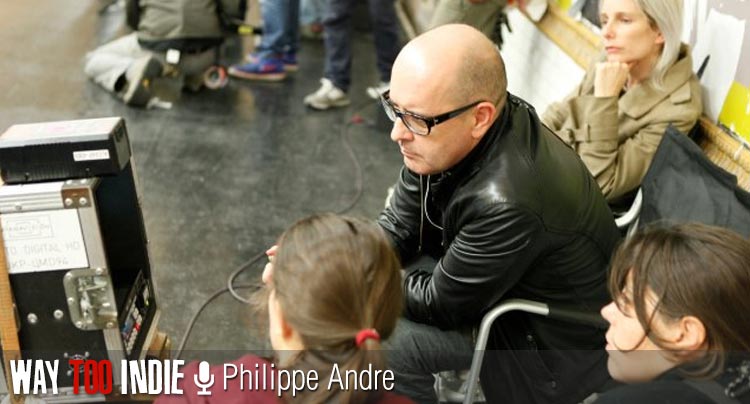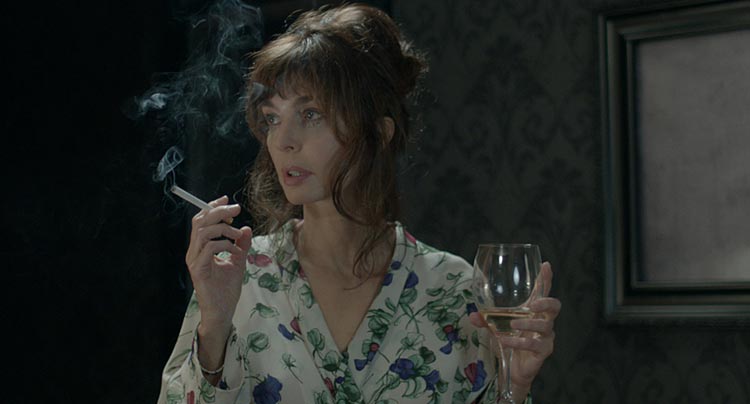Philippe Andre talks about the universal story behind ‘Delicate Gravity’

A gossamer drama that’s grounded in reality while it floats in a fragile fissure, Delicate Gravity is a short film that is simple, yet deeply affecting. Philippe Andre’s tale centers around Paul (Yvan Attal), a lonely, weary man, who seems to have reached the lowest point in his life, and how it takes a turn when he receives a voicemail message from a stranger. Claire (Anne Parillaud), the woman on the other end of the line, was not only under the impression she was leaving the message to her lover, but also sounds worryingly distressed. And so, as Paul sets out to find this mysterious woman to let her know her message wasn’t received, we begin to learn more about these two characters, and as their despair becomes our own, so does their hope.
Delicate Gravity is a unique insight into the lives of two lost individuals, and a clever production that continues to draw us in even in its final moments. I spoke to Philippe Andre, who directed the short film as well as co-wrote it with American writer Daniel Hainey, via Skype to find out more about his charming creation.
This sort of thing happens often – we’re forever getting missed calls or messages from someone who has dialled the wrong number. But few really think much further on it, or have the intention of contacting or meeting the person on the other end of the line, so what made you want to portray that?
Well, first of all, this story kind of happened to me – not exactly the same story – but once, I found a message on my machine from a woman who was leaving a message to her lover, by mistake. It wasn’t the same dramatic message but she was sure she was talking to somebody else. So, starting from there I said “Why not develop that into something a bit more dramatic – what if this woman needed help, or what if it was more of a question of life and death?” and I started to develop that as a story – to tell a kind of love story, or impossible love story, in a way.
Are you trying to tell people anything with this love story?
No, I think I just wanted to show a very small moment, if you know what I mean, something that could happen in life…
To anybody?
Yeah, and everybody can find something in that. What I wanted to show was more about showing a woman through a man’s eyes – to make the portrait of a woman, but it’s absolutely as seen by this guy. I was trying to show that this woman – a woman – can make a choice like this, to spend a night with a man while still being in love with another man, which is something men don’t understand. (laughs)
One of the biggest things that struck me was how when we first meet Claire’s character, she seems pretty old and tired, and then as soon as she picks up the phone from her lover she instantly looked younger, fresher, happier – almost as though she’d gone back in time. Was that a very deliberate thing on your part?
Yes, I’m very happy you can feel that when watching the film because it was very much on purpose. She’s a great performer so it was fantastic to work with her – it was great that she was able to deliver that kind of performance which was definitely on purpose. We had to believe in it, and from the beginning I wanted to create this distance with her, between Paul and her – she’s a kind of iconic character.
And it’s pretty ironic when she asks Paul if her message sounds pathetic given his introduction where he’s leaving his ex-wife so many messages.
Yes, I think it’s important that she’s the kind of person who would be embarrassed to have been heard like that, vulnerable, whereas it doesn’t embarrass him at all.

The film’s gathering a lot of talk on an international level – how do you think it will resonate in other countries and cultures?
Honestly, I don’t know. We’ve had a very good response so far with awards and festivals. I think, strangely enough, even though it looks very French, the more specific it is, the more universal it can become, because it’s an honest simple love story in a way. Whatever your culture or country is, I’m sure people can find something in it because it’s so, so specific. I didn’t try to be general, I wanted this story to be very specific about these two people and this little moment in their life and I think telling their story as specifically as possible can make it resonate as wide as possible.
Do you think there’s a particular kind of person or audience that will relate to the film more and that you want to relate to the film more?
No, I don’t have any goals, I’m not targeting anyone. Honestly, we’ve had some private screenings here and there is a very wide range of people in the room you know, younger kids, women, men, and people were responding pretty well to it. I was surprised – I had the feeling it would appeal more to kind of older people, but teenagers were responding very well to the story. I don’t know why.
How long have you been working on this project?
I wrote it over 3 years ago, and I was trying to find the money all over the place. I eventually found the money in France and we started a year and a half ago. I was very lucky to find these actors who loved the script and wanted to be involved. Yvan is a very big actor in France – he was the first to read it – and when he read the script he loved it and was happy to go for it. So we were looking for an actress together, so we showed the script to Anne who loved it too. I’ve been very lucky – as soon as we started to go look for a producer it went very fast. But yeah I wrote the script 3 years ago with an American writer I was working with; we co-write together and I’m actually writing a movie now with him, a feature length with the same kind of impossible love story or “love lost” idea.
You didn’t find the actors until long after you’d written the script – did they bring anything to the script that was different to how you imagined your characters?
They brought a lot. I mean Yvan, who was the first to be brought into the project, asked me if I should not start from further down – to have the character a bit more by himself, a bit more lonely in the beginning than how it was in the original script, so I rewrote the opening scene in this little restaurant to make him seem more lonely. We wanted to have this character who was a bit weird and charming at the same time. So he was a big help for me, by pushing me to go further. And of course, he is such a great actor, and his way of working was very different to the way I worked with Anne. Anne loved the script as it was, and broached me a lot about the way to make the character like you described earlier – a bit more distant at first and then the further you go, the more you understand her and the more you share with her. And even working on the set with them was very different, because for preparation I did a lot of reading and almost rehearsing with Yvan. With Anne I did nothing – I just went on set and directed, without having even done any readings. It was good because I worked with Yvan a lot more than Anne, so I was very close to him, giving him direction as if he was the lead character. He is the man I tell the story through, so I have to know him very well, but for Anne’s character, I have to observe her and be a bit more distant from her. Anne didn’t want too much information, and Yvan wanted a lot of backstory on every single scene, so it was a funny way to work, but it was a very good experience for me.
How was the shooting process for you?
It was great fun to shoot! We shot in Paris last year in November/December, and we shot over 4 days and 1 night, so it was a quick shoot. But it was great – it was all about the performance so we honestly enjoyed that.
The soundtrack is so moving; how involved in that process were you?
I was really very involved in the music, because I have a musical background – I wanted to become a conductor. So I’ve made a conservatory of music, and some programmes of big musicians, and now the music is a part of the way I write and the way I direct. I always have a kind of colour of music in my head as I progress. I wanted this piece to be classic storytelling but not to be a classic movie – I wanted it to have a modern feeling – so it was very important to me to find a piece of music with a kind of modern texture and modern tone. For that reason, I have
The XX and the Chromatics who are very modern bands, and we have this texture of electronic music in way, but at the same time I have Johann Johannsson, who is a composer who’s a lot more classical. The way we merged all this music together, sometimes with the sound design, was for me the way to make the piece more modern, because this story could have been told in the 50’s or 60’s but I really wanted the story to be set nowadays.
As you mentioned, we see everything from Paul’s perspective – are you trying to create sympathy or are you trying to tell us that he’s at ease with what’s happened? Do you think the audience is going to feel sorry for him?
I think, yes, I want that, first of all because we start off with a character who is a bit depressed, a bit down. He calls his ex-wife and he leaves messages and messages even though he has nothing to tell her, but he has nothing to do, so he calls his ex-wife! But at the end we think he’s getting better; I think he has learnt a lot from Anne and she has learnt from him so basically it’s about these two people who need something; they were needing each other and have found themselves. It’s this encounter – this meeting during one night – and because of it I think he gets better for sure.
Yeah, it’s as though this encounter doesn’t need to last long for them to both take something away from it.
Not at all, and actually they can’t, you know, because as soon as she receives the phone call from the man she has been waiting for, we understand that she’s very much in love with him, and she has almost forgotten Paul is in the room. I think it’s a charming moment though; we begin to understand her in a way. And I think Paul was doing so badly at the beginning that when at the end he’s walking away with that little smile we think “Wow, this guy, he’s doing better in a way,” so I think we like to believe in that.
